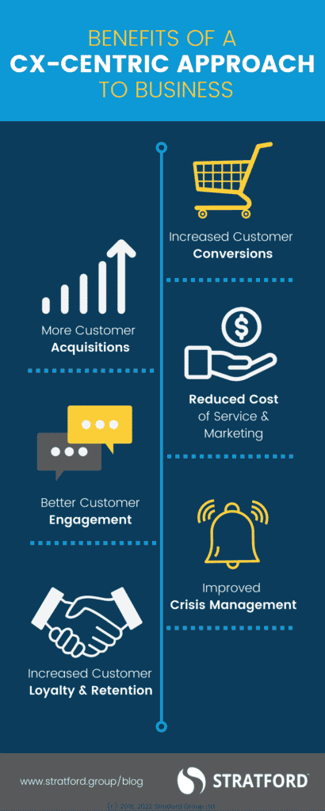Managers are always seeking ways to improve the performance of their business. When time or budget are limited, they must decide which areas of the business to invest in.
I believe Customer Experience (CX) is one of the most important areas to focus on. This blog is a follow up to Creating A Robust Customer Experience (CX) Strategy, with the six key advantages of Customer Experience explained in detail:

|
More customer acquisitionsWord of mouth marketing is not a new concept. However, the rise of digital and social media have made this form of marketing exceptionally powerful. Companies today rely on the goodwill of their customers to spread the word about their businesses. According to a Nielsen Study of 56 countries, about 92 per cent of consumers rely on recommendations from their friends and families. Social media and digital mediums play a vital role in customer acquisition. Innovative companies are leveraging their media presence to cultivate customer trust. They are ensuring consumers have a great experience from the first point of contact. And they are trying to build a long-term relationship with their customers to get solid word of mouth recommendations.
Better customer engagementConsumers trust businesses they already know, with customer engagement encouraging more interactions and building mutually beneficial relationships. Companies are reaching out to their existing customers with value-added propositions. They are using emails and social media to engage with consumers and get more feedback. These real-time interactions create an atmosphere where consumers are willing to share their needs with companies. In turn, companies can provide improved products and services. |
Increased customer conversions
An existing, satisfied customer is more likely to buy than a new prospect. So it’s a good idea to design a customer experience that can create a life-cycle of feedback and product offerings. It will increase conversion rates. However, the main objective should not be to increase revenue. Rather, companies should prioritize relationships.
The same concept can be extended to new prospects. Rather than treating prospects as binary sales points, companies should keep providing value through campaigns and interactions. It will build a relationship which will help convert prospects into long-term customers.
Reduced cost of service and marketing
A CX-centric approach helps companies understand their customers better. It leads to less guesswork about what customers want, which can add up to potential savings in marketing costs.
In traditional marketing, companies often keep calling the consumers to add new products or services without having any clue of their particular requirements. A CX-centric approach can have built-in checkpoints helping companies take a more customer-centric approach to marketing. Companies collect data, create business analytics and understand the market dynamics. It lowers costs, while increasing sales and customer satisfaction.
Improved crisis management
Trust is a pillar of great customer experience. When customers trust a business, they are more likely to communicate any complaints directly. This enables a company to manage its’ brand reputation without public outrage or humiliation.
A bad reputation can have implications beyond lost business. It can cause companies to lose potential investments and experience difficulties with attracting top talent. Honouring the trust of customers through an efficient and honest process during a crisis is essential. It can help companies prosper in the long-term, even if there are short-term temporary setbacks.
Increased customer loyalty and retention
Exceptional customer experience builds a foundation of loyalty and improves customer retention. People are looking for high-quality products and services at an optimal price.
Customers are willing to pay more for the same products and services if they feel the companies are providing extra value through interactions. And companies that provide the extra value are rewarded with long-term loyalty.
You May Be Interested In:
- Discover the Business Benefits of Customer Experience Excellence
- Six Advantages of Enhancing Member Experience for Associations
- Why a Great Customer Experience Management Strategy Matters (Survey Monkey)
- Customer Experience is not Shaped by Customer Service (Forbes)
- The Importance of Customer Experience in the Ages of Instant Gratification (Forbes)
- 6 Companies that Prove the Power of Word of Mouth Marketing (Huffington Post)
- Consumer Trust in Online Social and Mobile Advertising Grows (Nielsen)
- Strategies to Drive Customer Engagement in 2015 (Forbes)
This article was published more than 1 year ago. Some information may no longer be current.
